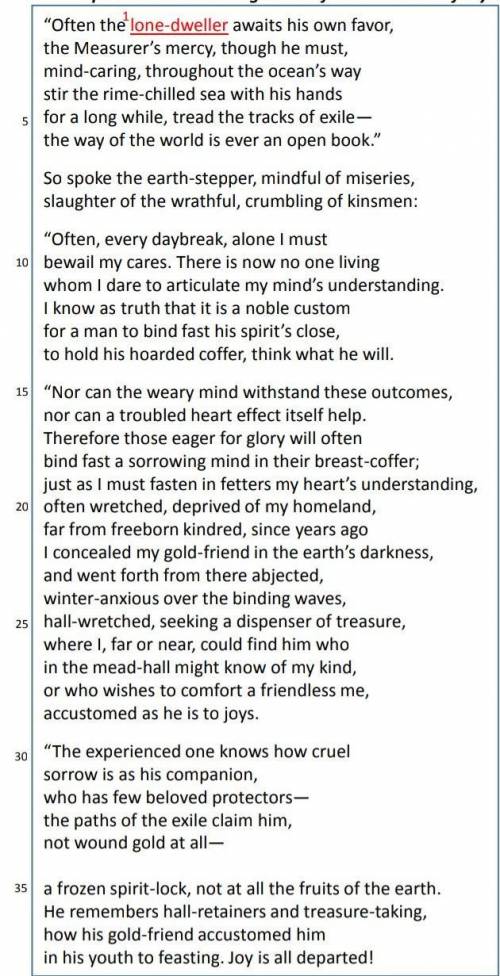"The Wanderer" Study Questions
1. What is the main loss that the Wanderer says he mourns?
2....

English, 01.10.2021 02:20 justhereforanswers13
"The Wanderer" Study Questions
1. What is the main loss that the Wanderer says he mourns?
2. What five other losses follow from this central loss?
3. Why did the Wanderer leave his home and embark on this sea voyage? (Lines 20-25)
4. What three happier memories does the Wanderer recall? (Lines 30-52)
5. Although the Wanderer values the wisdom of old age, what unstated loss might the Wanderer also be mourning? (Lines 52-60)
6. On what does the Wanderer blame these loses? (Lines 61-80)
7. How do these loses color his entire life?
8. How does the Wanderer personify sorrow (Lines 26-28)?
9. What is his attitude toward sorrow and what has he learned about sorrow?
10. How (5 ways) does the Wanderer describe a wise man (Lines 59-64)?
11. What are three words repeated in the poem that can summarize the Wanderer's attitude?
12. Explain how the wintry images and the nature images in the poem suit the speaker's mood.
13. When the Wanderer says that no man may be considered wise "who cannot reckon / many winters in the world," What does he mean?
14. What has the Wanderer learned about sorrow and misfortune?
15. Starting at line 62, the speaker moves from a personal perspective to a more spiritual, worldly outlook. Explain, using specific references to the text (Imagery, specific words, figurative language), what the speaker discusses and his attitude toward the concept/topic. **Hint-It is a religious event***


Answers: 2
Another question on English

English, 21.06.2019 16:30
Mr. culpepper has disdain for his students and does not respect them. mr. culpepper is trying to create a supportive environment for his students. mr. culpepper does not know his students and does not try to know them. mr. culpepper wants to his students but does not know how to do it.
Answers: 2

English, 22.06.2019 03:50
Which lines in this excerpt from act ii of william shakespeare’s romeo and juliet reveal that mercutio thinks romeo would be better off if he stopped thinking about love? mercutio: i will bite thee by the ear for that jest. romeo: nay, good goose, bite not. mercutio: thy wit is a very bitter sweeting it is a most sharp sauce. romeo: and is it not well served in to a sweet goose? mercutio: o here's a wit of cheveril, that stretches from an inch narrow to an ell broad! romeo: i stretch it out for that word 'broad; ' which added to the goose, proves thee far and wide a broad goose. mercutio: why, is not this better now than groaning for love? now art thou sociable, now art thou romeo; now art thou what thou art, by art as well as by nature: for this drivelling love is like a great natural, that runs lolling up and down to hide his bauble in a hole. benvolio: stop there, stop there. mercutio: thou desirest me to stop in my tale against the hair. benvolio: thou wouldst else have made thy tale large. mercutio: o, thou art deceived; i would have made it short: for i was come to the whole depth of my tale; and meant, indeed, to occupy the argument no longer.
Answers: 1

English, 22.06.2019 04:40
Whats the importance of gaining a general understanding of and interpretation of the work of literature. explain what the importance is to me
Answers: 2

English, 22.06.2019 06:30
What parts of hamlet’s soliloquy support a more negative outlook on life?
Answers: 1
You know the right answer?
Questions






Computers and Technology, 17.06.2020 17:57




Mathematics, 17.06.2020 17:57






Mathematics, 17.06.2020 17:57






